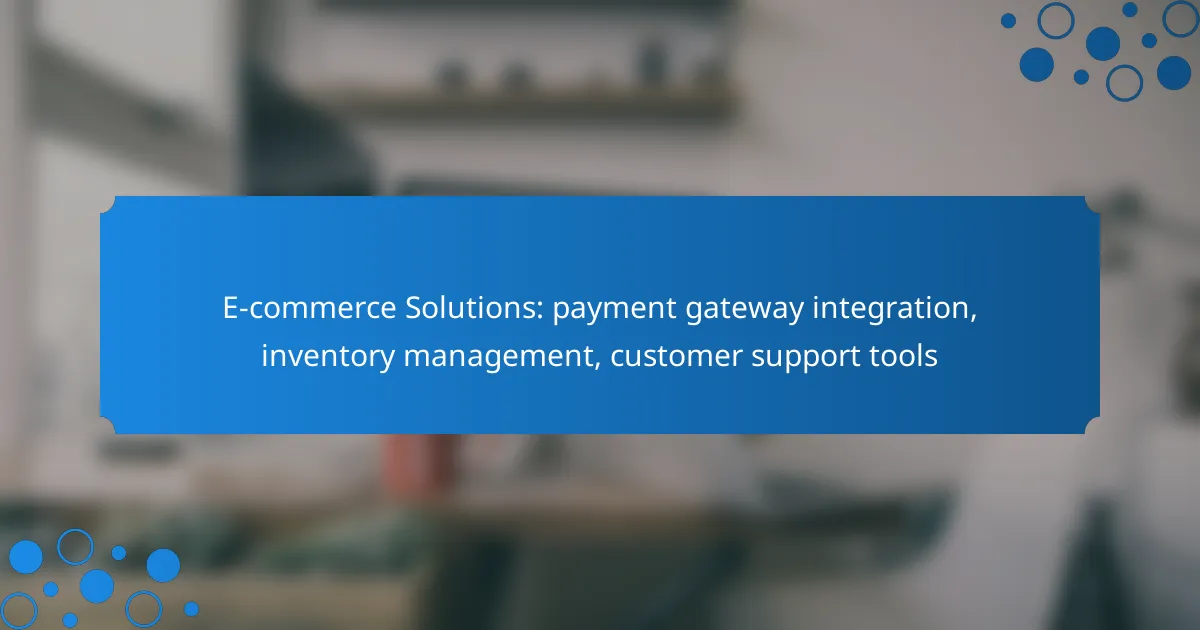In the competitive landscape of e-commerce, effective payment gateway integration, robust inventory management, and efficient customer support tools are crucial for success. Leading payment gateways like Stripe and PayPal provide diverse features tailored to various business needs, while inventory management software enhances operational efficiency. Additionally, customer support tools play a vital role in ensuring timely assistance, ultimately boosting customer satisfaction and loyalty.
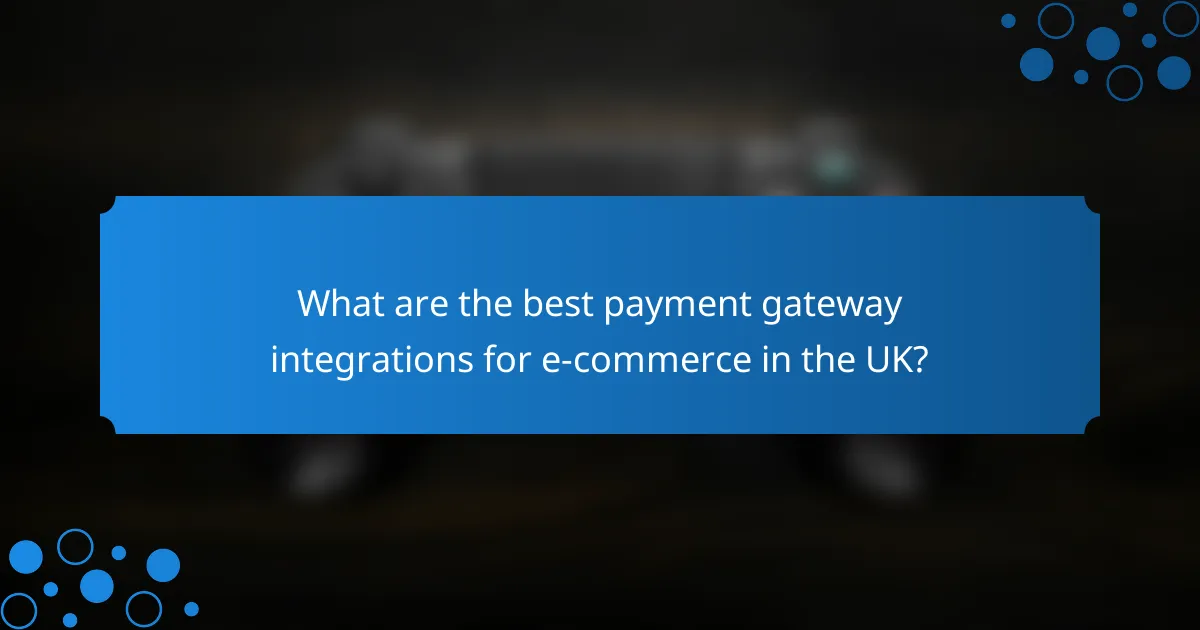
What are the best payment gateway integrations for e-commerce in the UK?
The best payment gateway integrations for e-commerce in the UK include Stripe, PayPal, Square, Adyen, and Worldpay. These platforms offer various features that cater to different business needs, including transaction fees, ease of integration, and customer support options.
Stripe
Stripe is a popular choice for e-commerce businesses due to its robust API and extensive features. It supports a wide range of payment methods, including credit cards, digital wallets, and bank transfers, making it versatile for various customer preferences.
Consider Stripe if you need advanced features like subscription billing, fraud prevention, and international payments. The platform charges a standard fee of around 1.4% + 20p for European cards, which is competitive for many businesses.
PayPal
PayPal is one of the most recognized payment gateways globally and is widely used in the UK. It allows customers to pay using their PayPal balance, credit cards, or bank accounts, providing flexibility and security.
PayPal’s fees typically range from 2.9% + 30p per transaction, which can be higher than some competitors. However, its brand trust can lead to higher conversion rates, making it a worthwhile option for many e-commerce sites.
Square
Square is known for its user-friendly interface and seamless integration with various e-commerce platforms. It offers a flat rate of 1.75% per transaction for online sales, which simplifies budgeting for businesses.
This gateway is ideal for small to medium-sized businesses, especially those that also have a physical retail presence. Square’s additional features, such as inventory management and sales analytics, can enhance overall business operations.
Adyen
Adyen is a comprehensive payment solution that supports multiple payment methods and currencies, making it suitable for businesses with a global reach. Its platform is designed for scalability, which is beneficial for growing e-commerce operations.
Adyen’s pricing model is based on transaction volume, typically around 0.6% + a fixed fee, which can be advantageous for high-volume merchants. Its advanced reporting tools also provide valuable insights into customer behavior and sales trends.
Worldpay
Worldpay is a well-established payment gateway in the UK, offering a wide range of services tailored to various business sizes. It supports numerous payment types, including card payments and alternative payment methods, ensuring flexibility for customers.
Worldpay’s fees vary based on the business model but generally range from 1.5% to 3% per transaction. Businesses should evaluate their transaction volume and average order value to determine if Worldpay’s pricing aligns with their financial goals.
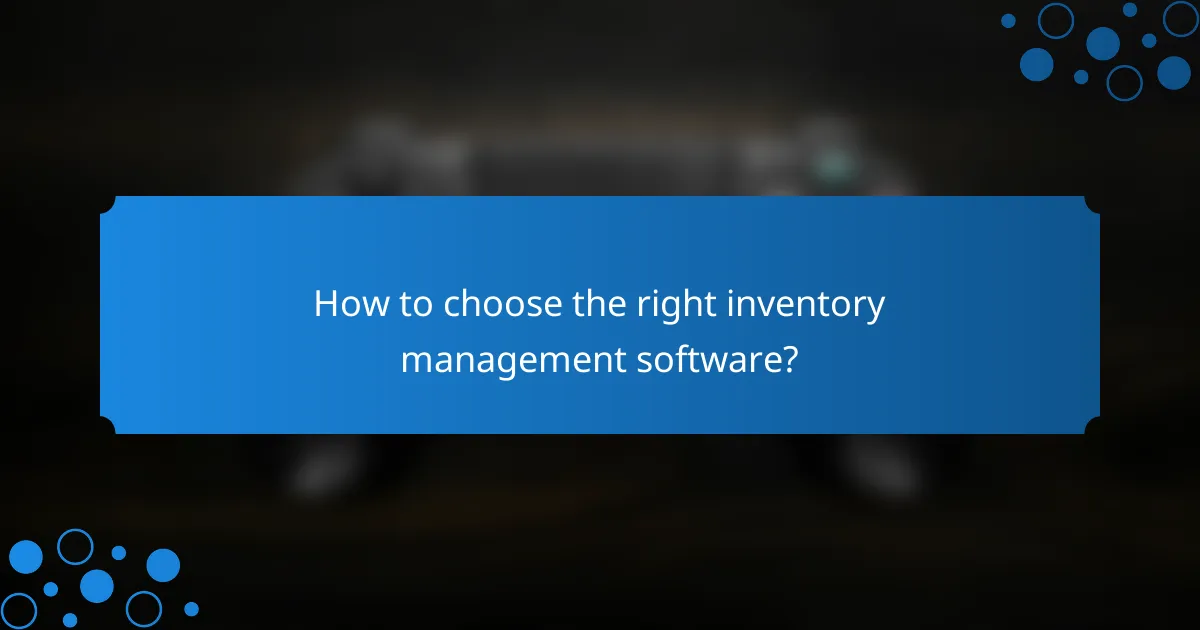
How to choose the right inventory management software?
Choosing the right inventory management software involves assessing your business needs, scalability, and integration capabilities. Focus on features that streamline your operations and enhance your ability to track stock efficiently.
Key features to consider
When selecting inventory management software, prioritize features such as real-time tracking, automated stock updates, and reporting capabilities. Look for systems that allow for easy categorization of products and provide alerts for low stock levels.
Additionally, consider user-friendly interfaces and mobile access, as these can significantly enhance your team’s efficiency. Integration with existing e-commerce platforms and accounting software is also crucial for seamless operations.
Top software options
Some popular inventory management software options include TradeGecko, Zoho Inventory, and Cin7. Each of these platforms offers unique features tailored to different business sizes and industries.
For small to medium-sized businesses, TradeGecko provides a robust solution with excellent integration options. Larger enterprises may benefit from Cin7, which offers advanced features for complex inventory needs.
Integration capabilities
Integration capabilities are vital for ensuring that your inventory management software works smoothly with other systems, such as payment gateways and e-commerce platforms. Look for software that supports APIs and has pre-built integrations with tools you already use.
For example, if you operate an online store, ensure that the inventory software can easily connect with platforms like Shopify or WooCommerce. This will help maintain accurate stock levels across all sales channels and streamline order fulfillment.
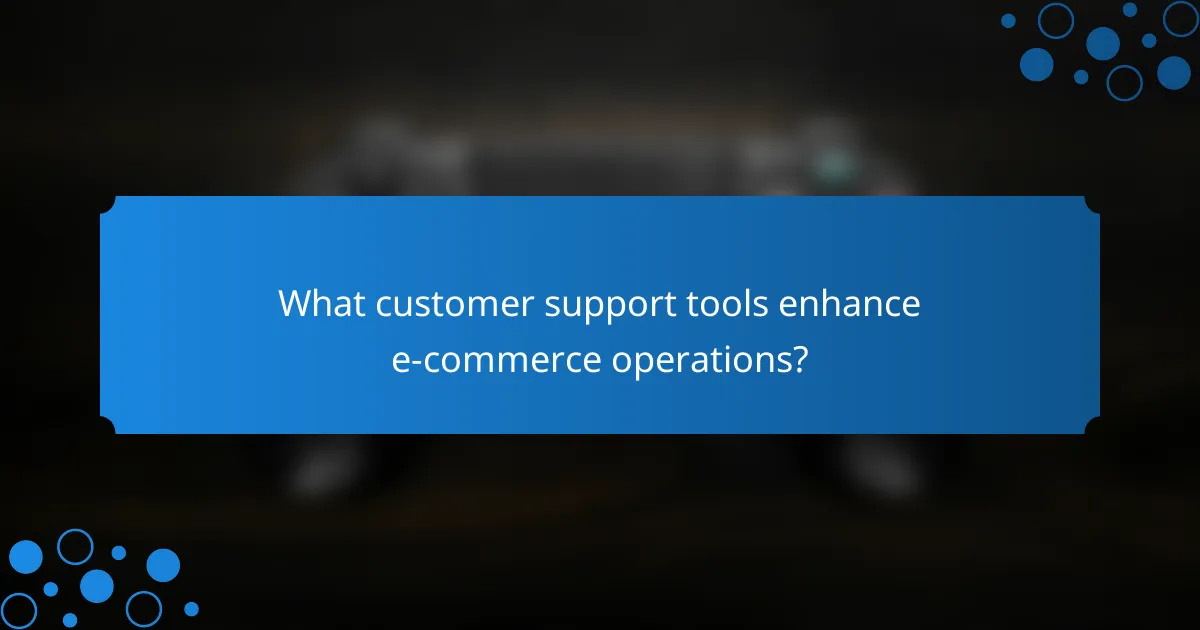
What customer support tools enhance e-commerce operations?
Customer support tools are essential for improving e-commerce operations by streamlining communication, resolving issues quickly, and enhancing customer satisfaction. These tools help businesses manage inquiries efficiently, ensuring that customers receive timely assistance and support throughout their shopping experience.
Zendesk
Zendesk is a widely used customer support platform that offers a comprehensive suite of tools for managing customer interactions. It provides ticketing systems, live chat, and a knowledge base, allowing businesses to track and resolve customer issues effectively. With its user-friendly interface, Zendesk can be integrated with various e-commerce platforms, making it easy to centralize customer communications.
Consider using Zendesk if your e-commerce business experiences high volumes of customer inquiries. Its automation features can help reduce response times, allowing your support team to focus on more complex issues. Additionally, Zendesk offers analytics tools to measure customer satisfaction and support performance.
Freshdesk
Freshdesk is another robust customer support tool that caters to e-commerce businesses by providing multi-channel support, including email, chat, and social media. It allows teams to manage customer queries from a single dashboard, improving response efficiency. Freshdesk also offers features like ticket prioritization and automation to streamline workflows.
This platform is particularly beneficial for small to medium-sized e-commerce businesses looking for cost-effective solutions. Freshdesk’s free tier provides essential features, while paid plans offer advanced capabilities like reporting and integrations with popular e-commerce platforms. Be mindful of selecting the right plan based on your business needs.
Intercom
Intercom is a customer messaging platform that focuses on real-time communication with customers through chatbots and live chat. It enables e-commerce businesses to engage customers proactively, answering questions and guiding them through the purchasing process. Intercom’s targeted messaging can help increase conversion rates by addressing customer concerns instantly.
When implementing Intercom, consider its integration capabilities with your existing e-commerce systems. This tool is ideal for businesses that prioritize customer engagement and personalized support. However, be aware of the potential costs, as pricing can escalate based on the number of users and features required. Regularly assess your usage to ensure it aligns with your budget and support goals.
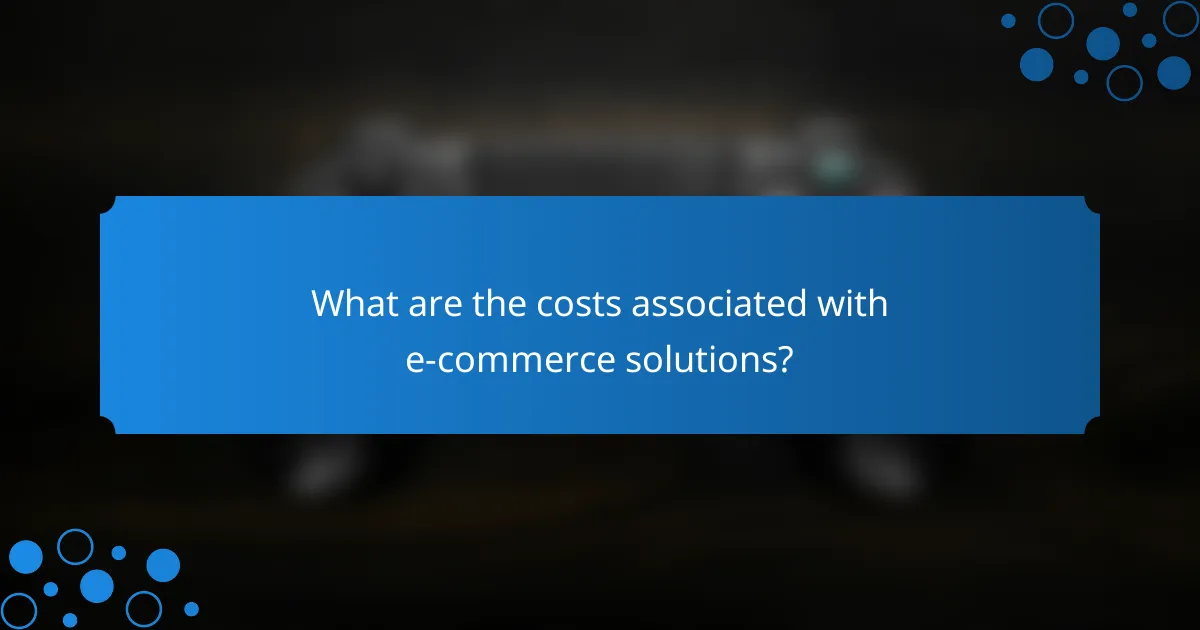
What are the costs associated with e-commerce solutions?
The costs associated with e-commerce solutions can vary significantly based on the services you choose. Key expenses include payment gateway fees, inventory management pricing, and customer support tool subscriptions, each of which plays a crucial role in your online business operations.
Payment gateway fees
Payment gateway fees typically range from 2% to 4% per transaction, depending on the provider and the volume of sales. Some gateways may charge a flat fee per transaction in addition to a percentage, which can affect overall costs. It’s essential to compare different gateways to find the most economical option for your business model.
Consider additional costs such as setup fees, monthly fees, and chargeback fees. For example, some providers may waive monthly fees if you meet a certain sales threshold, making it beneficial to analyze your expected transaction volume.
Inventory management pricing
Inventory management systems can cost anywhere from $20 to several hundred dollars per month, depending on features and scale. Basic solutions may offer essential tracking and reporting, while more advanced systems include integrations with e-commerce platforms and analytics tools.
When selecting an inventory management solution, consider your business size and growth potential. Some platforms charge based on the number of SKUs or users, so choose one that aligns with your current needs and future expansion plans.
Customer support tool subscriptions
Customer support tools generally range from $15 to $100 per user per month, depending on the features included. Basic plans may provide essential ticketing systems, while premium plans can offer advanced automation, multi-channel support, and analytics.
Evaluate your customer support needs to determine the right plan. A small business may start with a basic plan and upgrade as the customer base grows. Look for tools that offer free trials to assess their effectiveness before committing to a subscription.
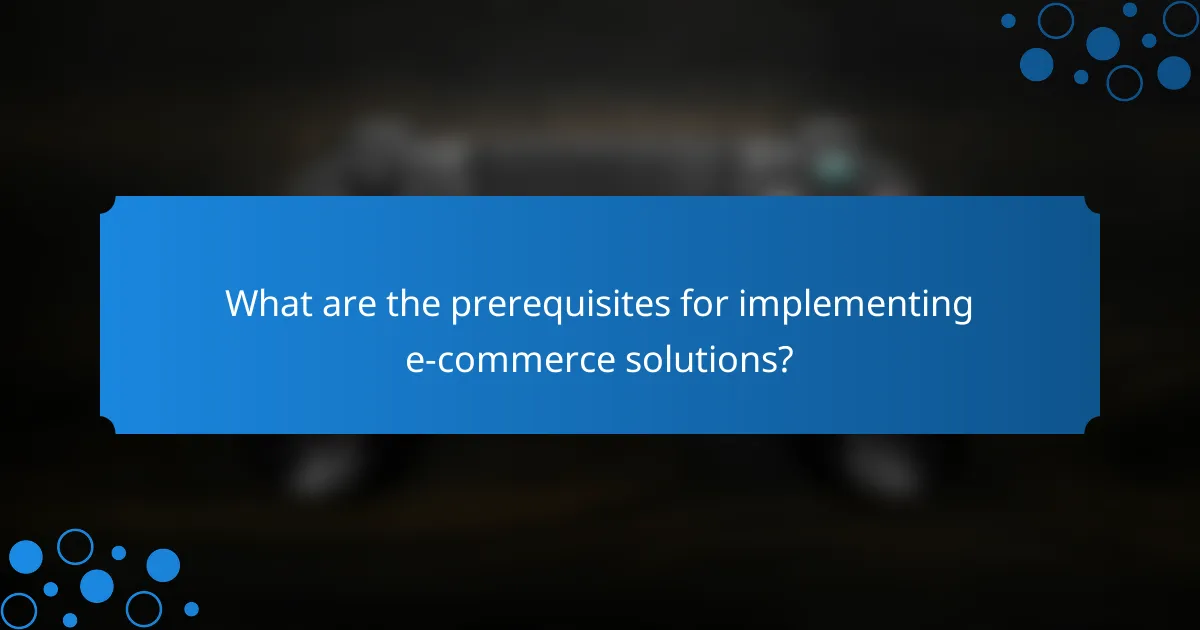
What are the prerequisites for implementing e-commerce solutions?
To successfully implement e-commerce solutions, businesses must consider technical requirements and team training needs. These prerequisites ensure a smooth integration of payment gateways, inventory management systems, and customer support tools.
Technical requirements
Technical requirements for e-commerce solutions include a reliable website hosting service, a secure payment gateway, and an efficient inventory management system. Ensure your website is optimized for mobile devices, as a significant portion of online shopping occurs on smartphones.
Additionally, compliance with data protection regulations, such as GDPR in Europe or CCPA in California, is crucial. This may involve implementing SSL certificates for secure transactions and ensuring customer data is handled appropriately.
Team training needs
Training your team is essential for the effective use of e-commerce solutions. Staff should be familiar with the e-commerce platform, payment processing systems, and inventory management tools. Regular training sessions can help them stay updated on new features and best practices.
Consider creating a training schedule that includes hands-on workshops and online courses. This approach can enhance team confidence and efficiency, ultimately leading to better customer service and streamlined operations.
